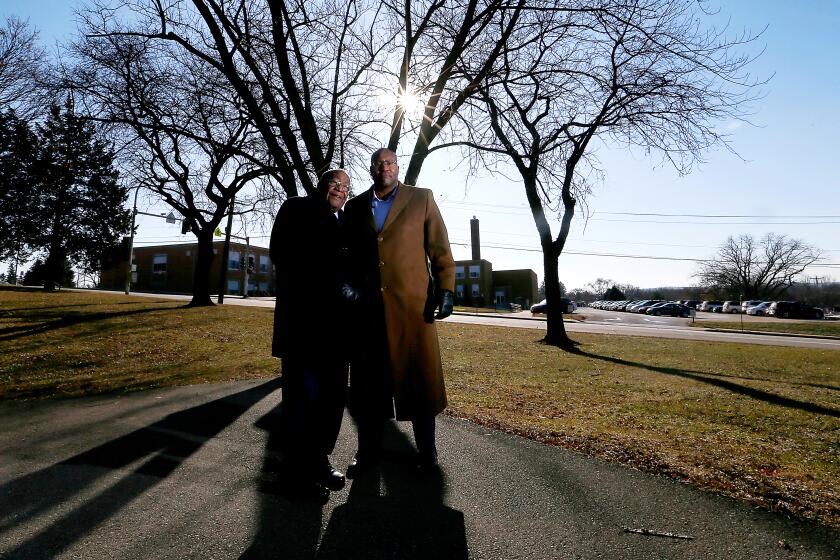On eve of the Iowa caucuses, Democrats play to voter excitement and fatigue
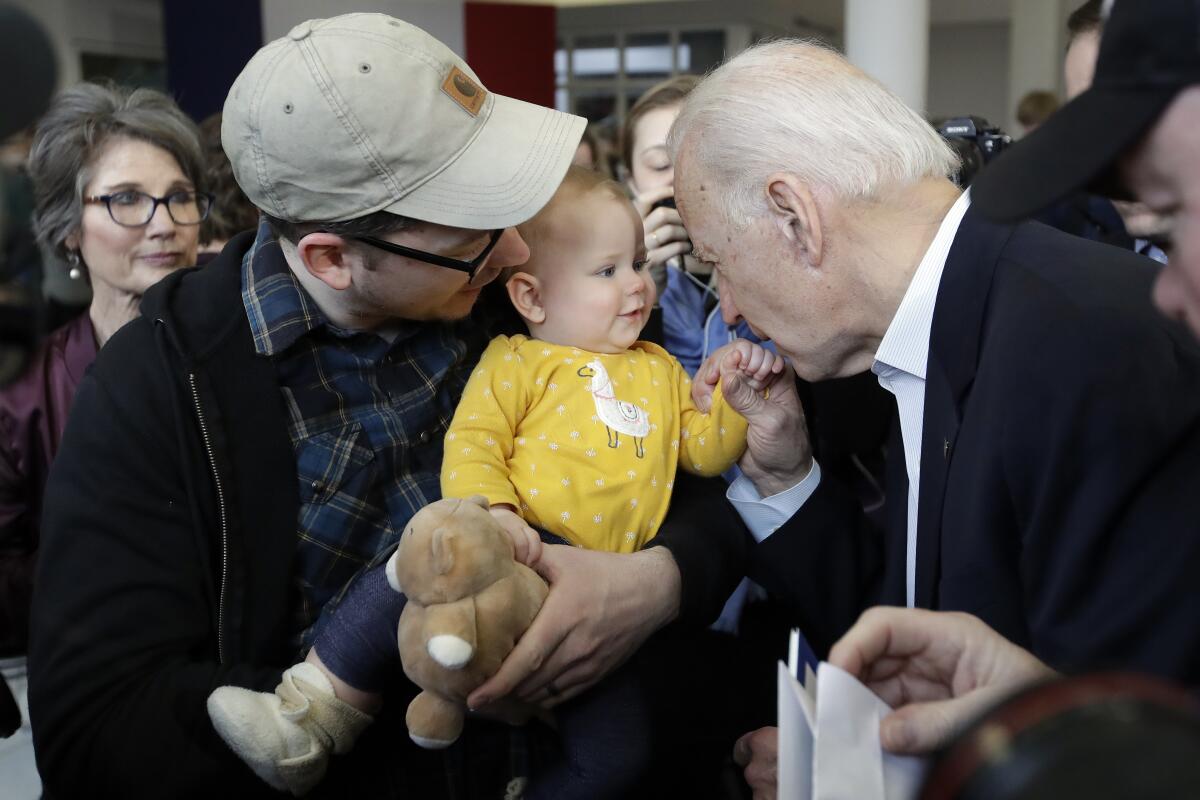
- Share via
CEDAR RAPIDS, Iowa — Democratic presidential candidates hopscotched across the state Sunday in their final day of campaigning before the Iowa caucuses, as jittery anticipation of the start of voting mixed with a bittersweet sense of the long buildup coming to an end.
The closing burst of politicking across Iowa marked the approaching finale of what has been an unusually protracted campaign season here. Iowans, who have been courted and cajoled by Democratic presidential hopefuls for more than a year, reported a mix of melancholy and relief that it all would soon come to an end.
Sunday’s crescendo lacked some of its anticipated punch, as candidates’ plans deferred to other major news events — the Super Bowl, the pending continuation of President Trump’s impeachment trial in the Senate — that have competed for voters’ attention.
Rallying on an unseasonably warm February day in high school gymnasiums and on college campuses, the contenders tailored their pitches to acknowledge the varied emotions of the big day finally arriving.
Elizabeth Warren struck a nostalgic note as she addressed 350 supporters in a packed college hall in Indianola, just south of Des Moines, as several hundred more milled outside after being shut out by the fire marshal.
Dubuque’s experience shows issues at play in the 2020 Democratic presidential campaign — race, justice, a reckoning with America’s history of enslaving blacks — are universal ones.
“A little over a year ago, I got in this race right here in Iowa, and in that time we’ve done town halls, taken thousands of unfiltered questions, lots of selfies,” the Massachusetts senator said.
She extolled the state’s vetting prowess, telling the crowd she appreciated their hard questions.
“You have made me a better candidate and you will make me a better president,” she said. “Thank you, Iowa.”
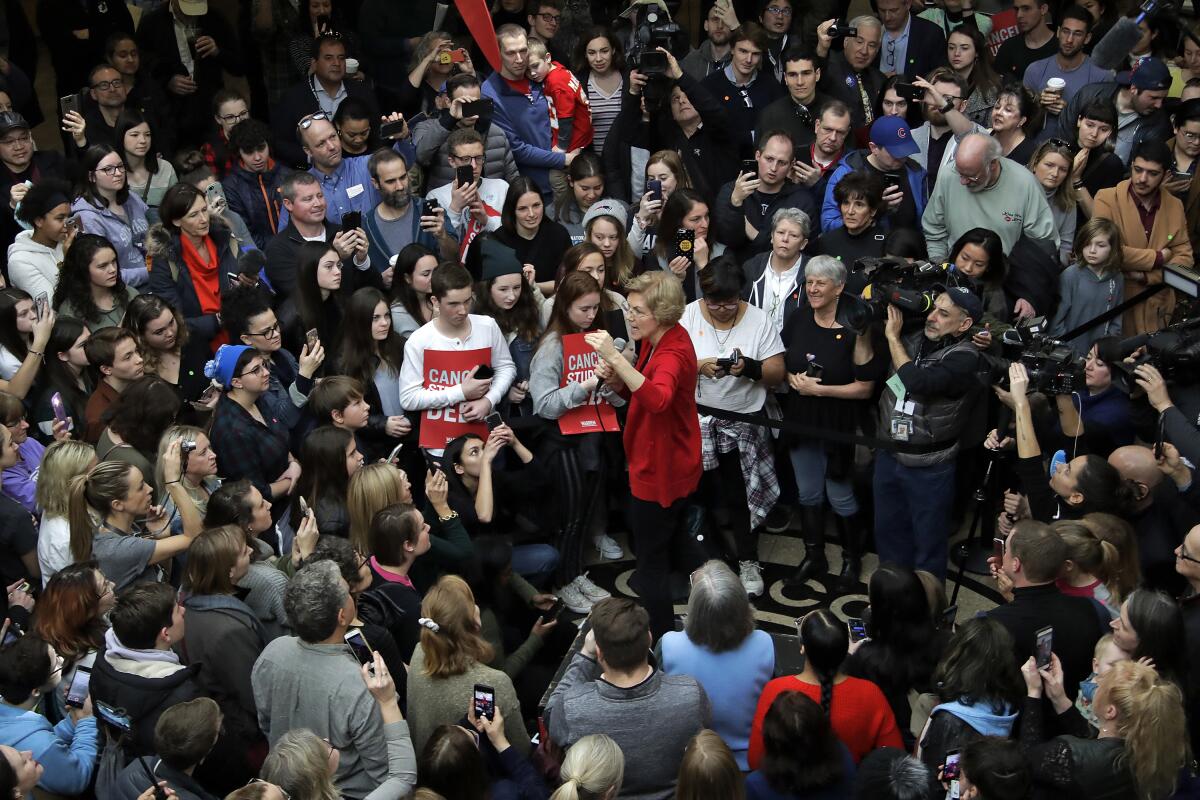
Nick Mahostadt, wearing a liberty green T-shirt identifying him as a Warren campaign precinct captain, said thinking beyond Feb. 3 made him feel a bit wistful.
He and his 11-year-old daughter, Lydia, have been volunteering at the campaign’s Indianola field office two or three times per week. Lydia, a sixth-grader, would make postcards for undecided voters and hand out literature.
“I know most people are tired of it, but we put a lot of time and energy into this, and so for it to kind of be nearing the end … I don’t know what we’re going to do after Monday. We won’t have an office to go to,” said Mahostadt, a 39-year-old project manager.
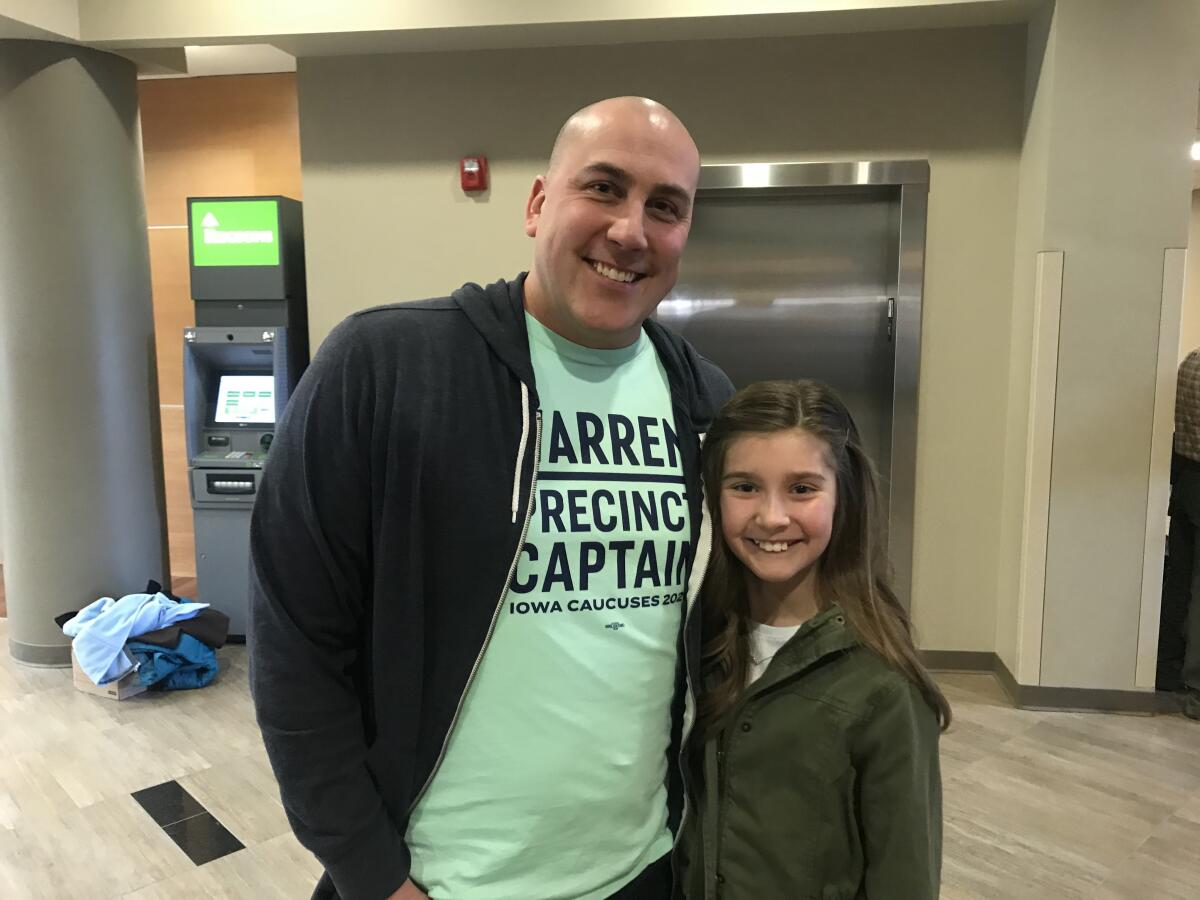
Pete Buttigieg, the former mayor of South Bend, Ind., seemed to sense the caucus fatigue in Coralville, in the eastern part of the state, near the University of Iowa campus, but he tried to roll that feeling into a metaphor of exhaustion with the state of the nation’s politics.
“I know it can be discouraging to watch what’s happening in Washington right now,” he said. “I live and breathe politics, and I feel exhausted by this process. And it creates the temptation to walk away, to switch it off.
“But this is the moment that we gotta do the exact opposite, because the good news in all of this is no matter what they do on the Senate floor, the Senate is the jury today, but we are the jury tomorrow.”
Coralville voter Adam Schwaje, a 40-year-old medical resident at a local hospital, says that while he’s excited about participating in the caucuses for the first time Monday, the campaign onslaught has been draining.
“I can’t even explain how many phone calls and text messages I’ve gotten,” he said as he and his 4-year-old daughter, Clara, left the Buttigieg event Sunday morning. “My phone just blows up. It’s ridiculous.”
Vermont Sen. Bernie Sanders closed out his Iowa campaign trying to stoke a sense of urgency among his committed fans, predicting that if the caucuses see record turnout Monday, his insurgent candidacy would win.
“We cannot simply complain about the status quo,” Sanders said to scores of volunteers at a campaign office in Cedar Rapids.
“Now is the time to end the complaining. Now is the time for action, and the action is tomorrow night.”
Many contenders folded the Super Bowl action of Sunday night into their final pitches. Andrew Yang, the New York entrepreneur and neophyte candidate, showed some political savvy in his team pick.
“I like the Chiefs tonight,” Yang tweeted, a good choice in Iowa, where many fans favored the neighboring Kansas City Chiefs over the San Francisco 49ers.
Perhaps none embraced the competing programming as much as Amy Klobuchar.
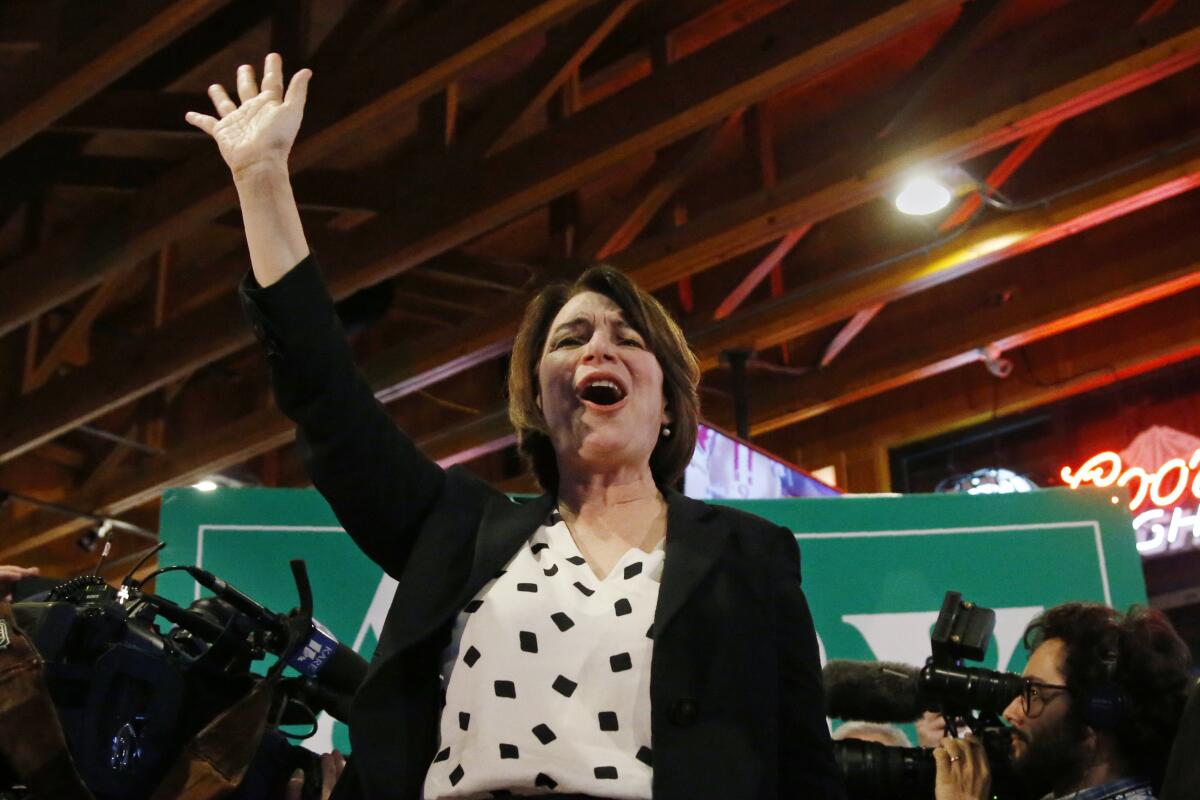
Her campaign picked up the food and beer tab at a packed barbecue joint in Johnston, a suburb of Des Moines. When the Minnesota senator arrived, she told the crowd that a silver lining of her hometown Minnesota Vikings not making the big game was that she could fully focus on the caucuses.
Then, in a nod to the continuing spectacle in Washington, she turned to football analogies to urge Iowans to turn out caucusgoers on her behalf Monday while she was stuck in the Capitol for the impeachment trial.
“I’m asking you to run for me, just like those guys running on the field,” she said. “I am asking you to take this over the goal post for me. I’m asking you to score a touchdown for me — OK, enough.”
What you need to know about the Iowa caucuses, including their history, how they work and how influential they will be for Democratic voters picking their 2020 presidential nominee.
Nearly all the Democratic candidates were in the state Sunday, from front-runners like Sanders and Joe Biden to those lagging, such as California billionaire Tom Steyer.
Even those not in Iowa used the Super Bowl for some high-profile, and highly expensive, campaigning. Former New York Mayor Michael R. Bloomberg, who has eschewed campaigning in the early primary states, and Trump aired competing television commercials during the game, which cost more than $10 million apiece.
Trump’s long-shot Republican challengers, former Massachusetts Gov. Bill Weld and former Illinois Rep. Joe Walsh, were both in Iowa in advance of the GOP caucuses, which are expected to tilt heavily toward Trump given his popularity in his party.
The big football game appeared to be far from mind for Biden, whose final event in Des Moines had a valedictory feel. The rally featured speech after speech from prominent endorsers such as former Iowa Gov. Tom Vilsack, as well as his wife and sister.
Biden himself dedicated seven minutes to point out notable backers in the crowd, even as kickoff time for the Super Bowl ticked closer.
The end of his speech coincided exactly with the game’s start. Although some in the audience trickled out early, he stayed long after.
Even if some Iowans lamented the coming departure of campaign frenzy, at least some people were certain the circus would come back to town.
Anita Micich, a former school superintendent, said she’s confident that Democrats will try to win back the state in November. Iowa voted for President Obama twice before voting for Trump in 2016.
“Iowa will be in play, that I can tell you,” Micich said.
Pearce reported from Cedar Rapids, Beason from Coralville and Mason from Des Moines. Times staff writer Seema Mehta in Indianola contributed to this report.
Get the L.A. Times Politics newsletter
Deeply reported insights into legislation, politics and policy from Sacramento, Washington and beyond. In your inbox twice per week.
You may occasionally receive promotional content from the Los Angeles Times.
